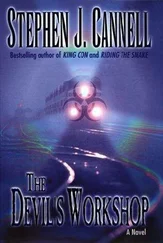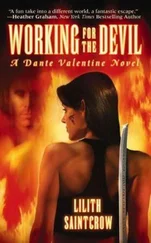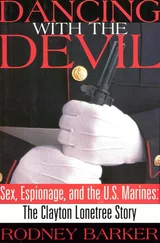Алан Джадд - The Devil's Own Work
Здесь есть возможность читать онлайн «Алан Джадд - The Devil's Own Work» весь текст электронной книги совершенно бесплатно (целиком полную версию без сокращений). В некоторых случаях можно слушать аудио, скачать через торрент в формате fb2 и присутствует краткое содержание. Жанр: sf_mystic, на английском языке. Описание произведения, (предисловие) а так же отзывы посетителей доступны на портале библиотеки ЛибКат.
- Название:The Devil's Own Work
- Автор:
- Жанр:
- Год:неизвестен
- ISBN:нет данных
- Рейтинг книги:3 / 5. Голосов: 1
-
Избранное:Добавить в избранное
- Отзывы:
-
Ваша оценка:
- 60
- 1
- 2
- 3
- 4
- 5
The Devil's Own Work: краткое содержание, описание и аннотация
Предлагаем к чтению аннотацию, описание, краткое содержание или предисловие (зависит от того, что написал сам автор книги «The Devil's Own Work»). Если вы не нашли необходимую информацию о книге — напишите в комментариях, мы постараемся отыскать её.
The Devil's Own Work — читать онлайн бесплатно полную книгу (весь текст) целиком
Ниже представлен текст книги, разбитый по страницам. Система сохранения места последней прочитанной страницы, позволяет с удобством читать онлайн бесплатно книгу «The Devil's Own Work», без необходимости каждый раз заново искать на чём Вы остановились. Поставьте закладку, и сможете в любой момент перейти на страницу, на которой закончили чтение.
Интервал:
Закладка:
Edward remained immobile, his pen still poised above his own open book. He held the page flat with his left hand and on his face was an expression of abstracted absorption. It made him look extraordinarily young, his cheeks smooth and boyish. It reminded me of Chantal when I had observed her playing the piano in her parents' flat. She was not an experienced pianist and she had not known she was being observed; her face had shown an intense listening vacancy, remote, unselfconscious, like Edward's now. When she saw me she was for a moment lost and confused, then irritated, finally briskly dismissive of her efforts.
'What's that noise?' I asked Edward.
He started as if someone had slapped his face and for a moment seemed not to know where the question had come from. 'What noise?'
My impulse was to apologize but I felt suddenly guilty and I wanted to justify myself. 'That scratching. I could hear someone writing and I thought it was you but you weren't moving.'
He stared at me. 'You heard it?'
'Yes. Pen on paper. I'm sure that's what it was.'
'How long for?'
'The last minute or two. Since you've been thinking what to write.'
'Can you hear it now?'
'No.'
He looked down. 'It only happens when I'm thinking.' He quickly wrote an inscription in the book and handed it back.
'But what do you think it is?' I persisted.
He stared at me in a way that made me feel uneasy, as if he were someone assessing my future without any reference to myself. The blue of his eyes so enhanced their expressiveness that it took very little to make them intimidating. 'Have you eaten?' he asked.
I had not; Chantal was out that evening and I had been going to get fish and chips.
'Eat here,' he said. 'There's something in the oven.
He got up and led the way down the hall to the kitchen.
I had never eaten anything cooked at Edward's. Indeed, I had never known him use his oven; he simply did not cook. I was so surprised that I gave up my pursuit of the scratching.
In the kitchen was a woman. My reaction must have been obvious because I remember I stopped in the doorway long enough for Edward to look round and say, rather peremptorily, 'Come in, come in.'
She was shorter than I remembered but there was no mistaking the dark hair, dark eyes and sharp, quizzical beauty. Her hair was in a ponytail, as in the restaurant with Tyrrel that day, and it emphasized the slightly Asiatic shape of her cheekbones and eyes.
'This is Eudoxie,' said Edward.
We shook hands. I assumed from her accent that she was French, and said so.
'Partly, un peu. A little of everything.' She wore dark red lipstick and when she smiled her teeth showed very white and even, packed closely together.
'He's having dinner with us,' Edward said curtly.
She smiled again and began to busy herself around the stove while Edward and I sat at either end of the small table. She poured us each a glass of red wine and left the bottle between us, having waited like a waitress for Edward to taste. That seemed to be her role and even when she joined us for dinner she said little. I was fascinated; there was something wonderfully cosmetic about her and watching her face had the same fascination as watching a fire, the same flickering continuity and inconstancy, unchanging change. I was also fascinated by the way she and Edward were with each other. It was not only that she didn't look convincing playing the part of Oriental wife or waitress but that she and Edward gave the impression of having been a long time together. They were relaxed and familiar — 'familiar' was a word that occurred to me time and again with regard to Eudoxie — as if long past the stage of tiptoeing around each other that most couples go through.
Over dinner, which was chicken with garlic, onions, olives and rice, Edward and I talked books. Eudoxie ate in silence except for one interlude. I had mentioned J. P. Curran, a novelist even less known now than then, who had also met Tyrrel. I can't remember how I came to bring him up but I suspect I was so conscious of Eudoxie's connection with Tyrrel and felt so awkward about mentioning it directly that I kept stumbling upon references to the Old Man. I must have mentioned him half a dozen times during that meal. Anyway, the sad story of Curran is that he wrote a brilliant first novel as a result of which he was invited to stay with Tyrrel, something as unheard of as Tyrrel's invitation to Edward. Perhaps Tyrrel had seen Curran as an acolyte. Anyway, something went wrong and Curran left early. He left no account of his visit but was said to be writing a novel based on Tyrrel at the time of his premature death in Lincoln; the manuscript was never found.
I had said what a loss this was and Edward said he had never read Curran's book. Eudoxie raised a delicate forkful to her lips and shrugged.
"It was his own fault,' she said. 'He had his chance but did not take it.'
I asked what she meant.
'He could have written much more but he didn't accept what was offered.'
Her manner was remarkably unsympathetic. I felt as if I had said something which, however inoffensive to my ear, was to hers contentious. I tried to ameliorate. 'Well, it's a pity we can never now have the books he would have written.'
"Of course we can,' she said sharply. 'Books are as inevitable as writers. They come when the time is right for them. The books Curran could have written will be written by someone else.'
This bizarre idea she asserted with such confidence that I did not argue. I had heard Edward talk of books as "pre-existing', as waiting to be written, of authors as midwives, but I had assumed he was talking metaphorically. Eudoxie spoke with the literal-minded confidence of the stupid, but I couldn't believe she was that. Then I was struck by something that passed between them. It was nothing in itself, only a glance and only from him to her. She was looking at me as she slid the fork between her packed white teeth and I don't know whether she saw it, though she might have sensed it. It was a submissive glance, something I had never associated with Edward, a mute, almost canine submissiveness. It was not the last time I was to see it and it always stood out against the general pattern of her behaviour with him, which was that of a privileged servant who did not protest against his browsing amongst other women. What most surprised me was that it was over questions of writing that he deferred, and I began to feel that in all other areas he operated as it were under licence, albeit a generous one. Nor, so far as I could then see, did she stop him writing what he wanted; it was simply that now and again she would make some surprising and definitive pronouncement on a question of literary provenance or inspiration and Edward would mutely defer. It was not like him — or rather, it was like what he became but not what he had been.
When he showed me out that night we stood talking at the door for a while. For the first time since I had known him I sensed he was making small talk. We stood on the steps and talked Victorian architecture; we watched the wind blow rubbish along the street and talked of contemporary slovenliness; I think we might even have talked about the stars, as the next thing to look at, had not this change in Edward struck me enough to make me bold. I asked again what he thought the writing noise was caused by.
He watched a newspaper being blown along the railings. It made half-hearted and unavailing attempts to save itself as it was harried ever farther down the street. 'It's probably my imagination,' he said slowly. 'When I'm thinking, you know. A projection of some sort like a poltergeist. '
'You've heard it before?'
'Don't mention it to anyone, especially not to Eudoxie.'
'I suppose it might frighten her.'
He glanced at me, then back at the paper.
Читать дальшеИнтервал:
Закладка:
Похожие книги на «The Devil's Own Work»
Представляем Вашему вниманию похожие книги на «The Devil's Own Work» списком для выбора. Мы отобрали схожую по названию и смыслу литературу в надежде предоставить читателям больше вариантов отыскать новые, интересные, ещё непрочитанные произведения.
Обсуждение, отзывы о книге «The Devil's Own Work» и просто собственные мнения читателей. Оставьте ваши комментарии, напишите, что Вы думаете о произведении, его смысле или главных героях. Укажите что конкретно понравилось, а что нет, и почему Вы так считаете.











